
Your body needs some cholesterol to build cells—but it’s the excess cholesterol that can be a problem, the American Heart Association explains. Your liver produces the natural cholesterol you need, while any excess cholesterol in your body generally comes from animal-based foods.
Nick West, MD, cardiologist, chief medical officer, and divisional vice president of global medical affairs at Abbott’s Vascular Business says that “although the amount of cholesterol circulating in the blood is genetically determined, diet’s impact should not be understated.”
The Best and Worst Diets for Your Cholesterol, Says UCLA Cardiologist
Dr. West says one diet that can help with cholesterol is the DASH diet, (short for Dietary Approaches to Stop Hypertension). According to the Mayo Clinic, the DASH diet can lower low-density lipoprotein (LDL or “bad”) cholesterol levels in the blood and is endorsed by the American Heart Association and the American College of Cardiology.
The DASH diet consists mainly of vegetables, fruits and whole grains, and includes fat-free or low-fat dairy products, fish, poultry, beans and nuts (more ideas for foods to eat on the DASH diet are available here and here). This heart-healthy eating plan limits foods that are high in saturated fat, such as fatty meats and full-fat dairy products.
You don’t necessarily need to follow the DASH diet to the letter to see its benefits, though. You could try tweaking your current eating habits in ways that can significantly impact your cholesterol levels for the better. Dr. West and registered dietitian Theresa Gentile, MS, RDN, CDN—who is a national spokesperson for the Academy of Nutrition and Dietetics—list the top seven foods you should limit when you’re trying to get your cholesterol under control.
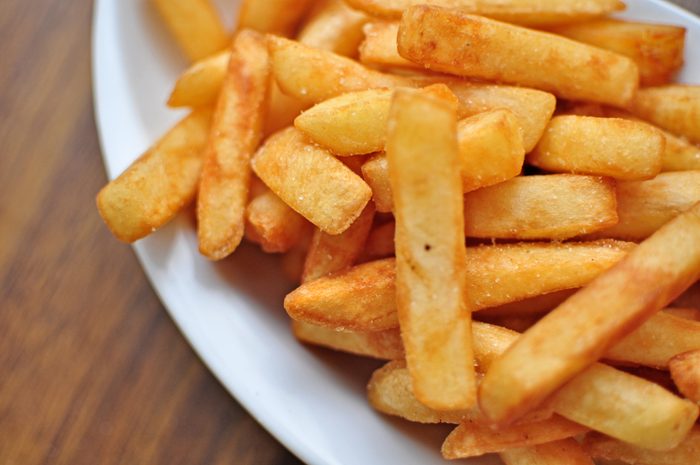
Fried foods
French fries and onion rings might be tempting at the pub or drive-thru window, but they generally raise your LDL (low-density lipoprotein) level, also known as “bad” cholesterol, and often contain trans fatty acids.
Gentile says trans fatty acids have been shown to increase cardiovascular mortality and disease in a manner similar to saturated fatty acids.
Eating These Foods Can Lead to Premature Death, Says New Study
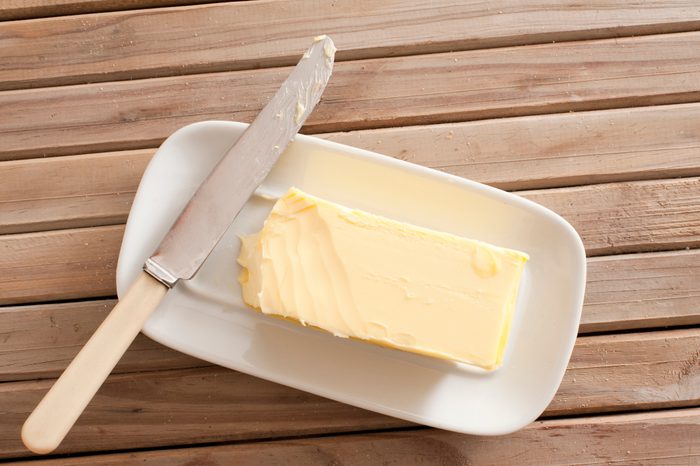
Butter
Butter is high in saturated fatty acids (which are derived from both animal fats and plant oils) and can be a culprit for increased cholesterol levels, says Gentile.
The American Heart Association recommends about 13 grams of saturated fat per day.
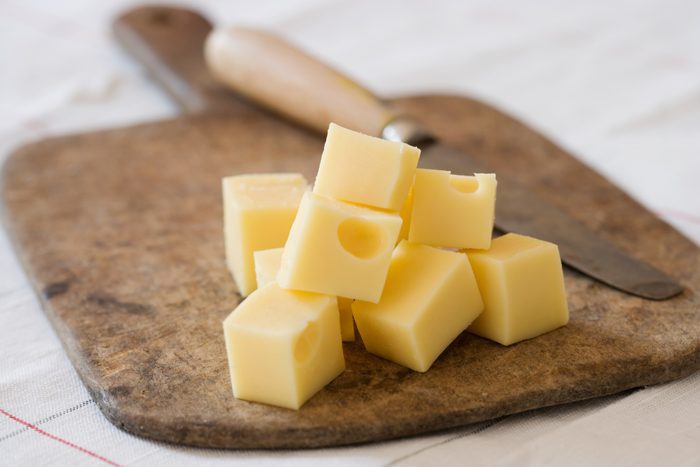
Cheese
Cheese has become such a staple for many of us, as it’s high in protein and calcium—just be aware that cheese is also high in saturated fatty acids.
You probably don’t need to remove cheese completely out of your diet, but a fondue pot or a cheeseboard should be a rare treat, not a regular affair. The Healthy @Reader’s Digest’s Medical Review Board co-chair Latoya Julce says moderation is key for dairy in general.

Baked goods
Cookies, cakes, cupcakes are certainly delicious, but baked goods also contain a high amount of butter or shortening…which—you guessed it—can be high in saturated fat.
Baked goods also usually contain high amounts of sugar. If an everyday sweet treat is a tough habit to break, read Craving Sugar? A Dietitian Says You May Need More of This Surprising Nutrient.

Tropical oils
Tropical oils, like palm oil and coconut oil, should also be limited. Gentile says that in some studies, these oils seem to raise both bad cholesterol levels (LDL) and good levels (HDL).
If you often use coconut oil in your cooking, don’t go crazy with the amount. Also, rotate in avocado oil or olive oil when possible.
Coconut Oil Is Not a Superfood—and 6 Other Reasons You Need to Consume It Mindfully
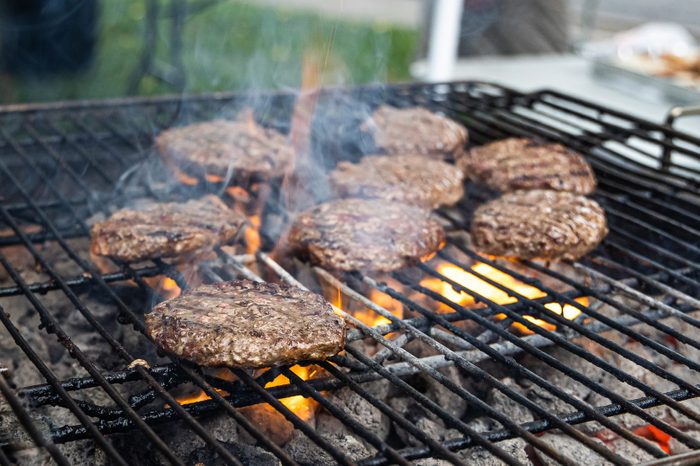
Beef
Gentile recommends limiting your consumption of it because of its high saturated fat content (100 grams of untrimmed beef contains about 99 milligrams cholesterol and 29.4 grams of saturated fat).
Says Dr. West: “Consumption of both red meat and processed meats has shown a consistent relationship across multiple studies with increased risks of heart disease, cancer and diabetes—with the extent of increased risk varying with the amount of red meat eaten. That said,” he adds, “red meat is a good source of dietary protein, iron and vitamin B12—but current guidance, despite such benefits, is to limit intake to no more than two or three servings per week.”
To visualize a serving size, think of a half-cup or three ounces—which is about the size of a deck of cards.
Here’s What Happens to Your Skin When You Stop Eating Meat, Say Diet and Dermatology Experts
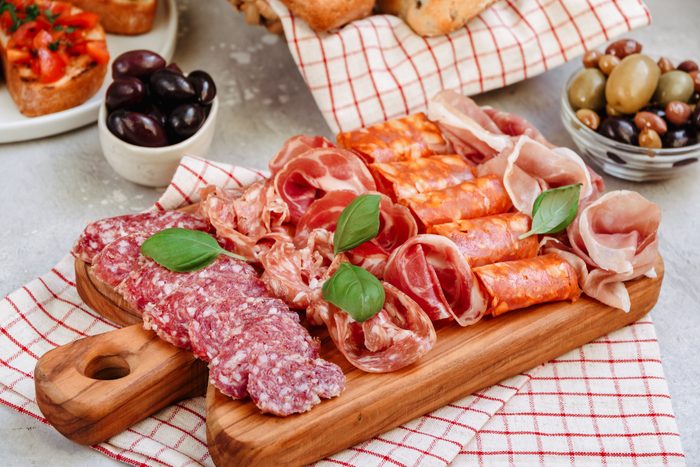
Processed meats and sausage
Gentile says deli meats and sausages should be eaten minimally because they’re often comprised of the fattiest cuts of meat.
Dr. West highlights the “high salt content” in processed meats like sausage bacon, and sliced meats. That salt, he says, is “additive to the risk of cardiovascular disease.”

Next Steps
Limiting the amount of foods with high cholesterol can be a good place to start—however, Dr. West says, it’s important to manage your own demands on yourself. “For people with high cholesterol, a completely cholesterol-free diet is impossible to follow—so moderation and choosing lower-fat options where possible is advisable,” he explains. “That said, a plant-based diet can go a long way to cutting dietary intake of cholesterol: Fruits and vegetables contain little, if any, cholesterol, and the added high fiber and vitamin content is not only heart-healthy, but may reduce the risk of cancer also.”
- The 3 Foods This Cardiologist NEVER Eats—and 5 Foods He Eats Every Day
- 5 Long COVID Symptoms That’ll Help Explain the Way You’re Feeling
- 9 Food Safety Rules Every Party Host Has Got to Know
- Jewel’s Got a New Title To Take On Mental Health—In the Metaverse
- If You Have Blue Eyes, You’re Related to a Lot More People Than You Thought

